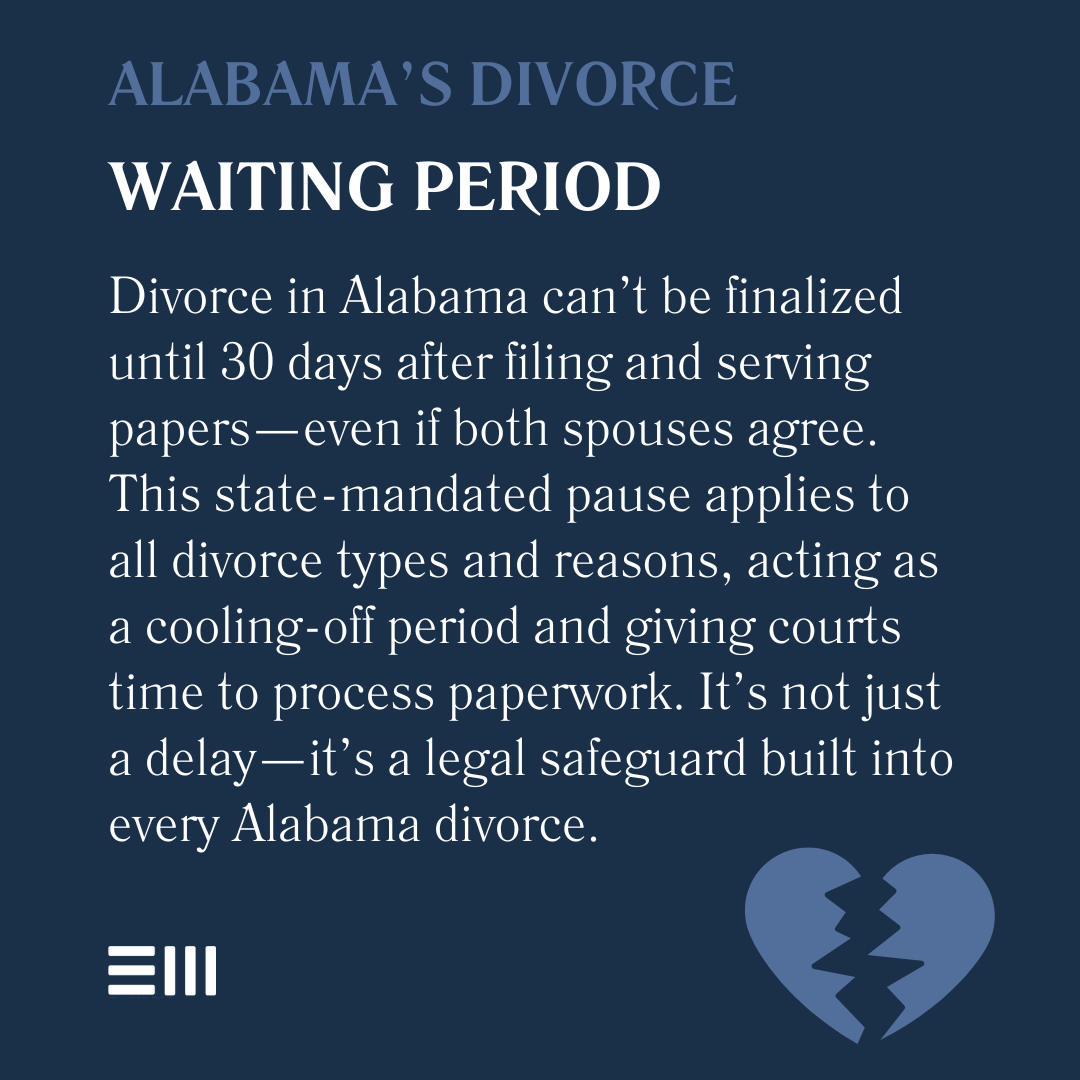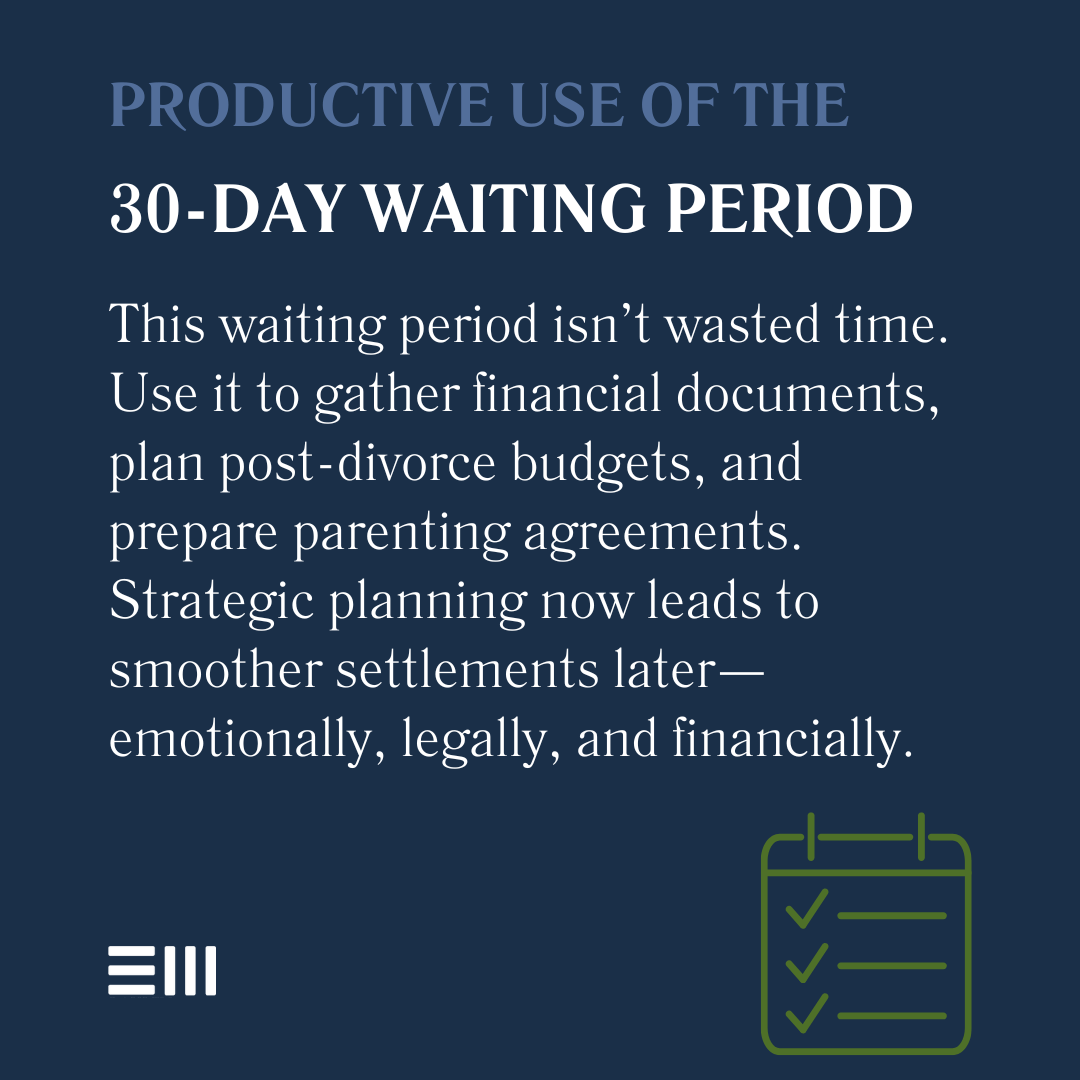While couples in Vegas can marry in minutes, Alabama law mandates that endings require more patience than beginnings—creating a 30-day cooling-off period between filing divorce papers and finalizing the dissolution.
This waiting period affects everyone from newlyweds realizing they've made a mistake to couples who've spent decades building lives they now seek to unwind, serving as both a blessing and burden depending on your particular circumstances.
Understanding Alabama's Mandatory Divorce Waiting Period
Alabama divorce waiting period represents a specific timeframe during which a divorce cannot be finalized, even when both parties agree completely on all terms. This state-mandated pause serves multiple legal and practical purposes within Alabama's family court system.
The 30-day waiting period begins on the date divorce papers are filed with the court and served to the non-filing spouse. This timeframe exists regardless of whether the divorce is contested or uncontested, though contested divorces typically take significantly longer due to negotiation requirements and court scheduling.
The waiting period applies equally to all grounds for divorce in Alabama, including incompatibility, abandonment, adultery, cruelty, addiction, and imprisonment.
This mandatory period functions as both a procedural safeguard and a cooling-off period, giving couples time to reconsider their decision while allowing courts to process the necessary paperwork.
While it may seem like an inconvenient delay, this waiting period often provides valuable time for proper preparation of financial disclosures and parenting plans necessary for comprehensive divorce settlements.
Exceptions and Extensions to the Standard Waiting Period
While Alabama generally adheres to the 30-day minimum waiting period, certain circumstances can either shorten or lengthen this timeframe. Understanding these exceptions helps set appropriate expectations about your specific divorce timeline.
Situations that may extend the standard waiting period include:
- Contested divorces involving property disputes or child custody disagreements;
- Cases where one spouse cannot be located for proper service;
- Military divorces with active-duty service members deployed overseas;
- Complex asset division requiring business valuation or property appraisals;
- Court docket congestion in your specific county;
- Incomplete or improperly filed paperwork requiring amendments;
- Mandatory parenting classes not completed within required timeframes;
- Temporary orders that need resolution before final judgment; and
- Judicial discretion based on case-specific circumstances.
While rare, certain emergency situations might allow expedited processing, particularly when domestic violence is involved.
However, even in these cases, the 30-day waiting period typically remains in effect, though emergency protective orders and temporary custody arrangements can provide immediate protection during this time.
The residency requirement also impacts timing—at least one spouse must have been an Alabama resident for six months before filing. This residency period is separate from the waiting period but represents another important timeline consideration when planning your divorce process.
How to Use the Waiting Period Productively
Rather than viewing Alabama's waiting period as merely a delay, this time can be strategically utilized to strengthen your position and prepare for post-divorce life. Taking specific actions during this period often leads to more favorable outcomes and smoother transitions.
Productive uses of the waiting period include:
- Gathering complete financial documentation including assets, debts, income, and expenses;
- Creating detailed household budgets based on post-divorce income projections;
- Consulting with financial advisors about tax implications and retirement account divisions;
- Researching housing options and securing new living arrangements if needed;
- Developing comprehensive parenting plans that address schedules, education, and healthcare;
- Attending co-parenting classes or mediation sessions to reduce conflict;
- Securing copies of important documents including birth certificates and insurance policies;
- Opening individual bank accounts and establishing independent credit;
- Changing beneficiaries on insurance policies where legally permitted; and
- Consulting with mental health professionals to address emotional aspects of divorce.
Using this time strategically prevents rushed decisions that often lead to post-divorce complications and additional legal expenses. Even in amicable divorces, careful preparation during the waiting period typically results in more sustainable agreements that better serve both parties' long-term interests.
Impact of Waiting Periods on Different Divorce Types
Alabama's waiting period affects various divorce situations differently, with timing implications that vary based on the specific circumstances of your marriage dissolution. Understanding these distinctions helps set realistic expectations for your particular case.
For uncontested divorces where both parties agree on all terms, the process typically takes 30-60 days from filing to finalization. The 30-day waiting period represents the minimum time, with an additional 1-4 weeks typically needed for court processing and judge signature. Counties with busier court dockets may experience longer processing times even for straightforward cases.
Contested divorces involving disagreements about assets, debts, alimony, or child custody extend far beyond the minimum waiting period. These cases typically require 6-18 months to resolve, with complex situations occasionally extending beyond two years. The waiting period becomes almost irrelevant in these situations as negotiation, discovery, and court scheduling create much longer timelines.
Default divorces, where one spouse does not respond to the divorce filing, require proof of proper service followed by additional waiting periods for the non-responding spouse. These cases typically take 45-90 days as courts require evidence of proper notification and opportunity to respond before granting default judgments.
Couples with minor children face additional procedural requirements that often extend timelines beyond the basic waiting period. Many Alabama counties require parenting classes, custody evaluations, or guardian ad litem appointments that add weeks or months to the process regardless of agreement between parents.
Frequently Asked Questions About Alabama Divorce Waiting Periods
Navigating divorce timelines generates many questions specific to individual circumstances.
The following information addresses common concerns about Alabama's divorce waiting period and related timing considerations.
Can I Waive the 30-Day Waiting Period in Alabama?
Alabama law does not generally permit waiving the 30-day waiting period, even when both spouses completely agree on all divorce terms. This mandatory cooling-off period exists by statutory design to prevent impulsive divorces and allow time for reconciliation consideration.
Even in emergency situations involving domestic violence, the waiting period typically remains in effect, though temporary orders can provide immediate protection. The court's focus remains on ensuring proper procedural safeguards rather than expediting the process based on parties' preferences.
Does Living Separately Before Filing Reduce the Waiting Period?
Prior separation does not reduce Alabama's 30-day waiting period, regardless of how long couples have lived apart before filing. Unlike some states that count separation periods toward divorce requirements, Alabama's waiting period begins only when divorce papers are properly filed and served.
However, pre-filing separation can accelerate the overall process by giving couples time to negotiate agreements, divide personal property, and establish separate lives before formal legal proceedings begin, potentially allowing for an uncontested filing that proceeds more efficiently.
How Does the Waiting Period Affect Child Custody Arrangements?
The waiting period itself does not prevent establishing temporary custody arrangements that take effect immediately upon filing. Through temporary orders, parents can create legally enforceable custody schedules during the divorce process.
These temporary arrangements often serve as frameworks for final custody determinations, making it essential to approach them thoughtfully rather than viewing them as merely short-term solutions. Courts prioritize stability for children, so custody patterns established during the waiting period frequently influence permanent arrangements in final divorce decrees.
Take Control of Your Divorce Timeline Today
Understanding Alabama's divorce waiting period puts you in a stronger position to navigate the process efficiently and effectively. With proper planning and expert guidance, you can use this mandated time to strengthen your legal position while preparing emotionally and financially for your next chapter.
Our experienced Alabama family law attorneys have guided hundreds of Alabama residents through the divorce process, helping them transform waiting periods from frustrating delays into valuable preparation time. We understand both the technical requirements and practical strategies that lead to favorable outcomes.
Contact Baxley Maniscalco today for a confidential consultation about your specific situation.


